POSTMILLENNIALISM IN THE GOSPELS (2)
 PMW 2024-097 by Kenneth L. Gentry, Jr.
PMW 2024-097 by Kenneth L. Gentry, Jr.
This is the second in a series on postmillennialism in the Gospels. In this article I will highlight the optimistic expectation for the advance of the kingdom in history.
Jesus presents his kingdom through his teaching and his practice, his words and his actions. He especially describes his kingdom in his Kingdom Parables, one of his major recorded discourses (Matt 13:1–52). Here he speaks in parables so that his followers might “know the mysteries of the kingdom of heaven” (Matt 13:11). These parables explain the mystery character of the kingdom, highlighting its hidden nature, small presence, and wavering condition (Matt 13:9–17, 19–22, 35–28, 31, 33, 44–45).
The Lord does not present a kingdom such as the first-century Jews and current-day dispensationalists expect. He does not lead a catastrophically-imposed, immediately-victorious, globally-dominating, military-political kingdom. Rather, he teaches something radically different. In fact, even his followers (who held first-century Jewish expectations) are initially confused about his kingdom: they “were hoping that it was He who was going to redeem Israel” (Luke 24:21; cp. Matt 13:36).
As per the postmillennial system, the Kingdom Parables sketch the present, spiritual, developmental, and dominating nature of the kingdom. This present, spiritual, developmental nature of the kingdom contradicts the first-century Zionistic and current-century dispensationalist conceptions. The dominating nature of the kingdom clashes with the amillennial scheme. Let us consider three of the seven Kingdom Parables to mold our understanding.
Great Tribulation: Past or Future?
(Thomas Ice v. Ken Gentry) 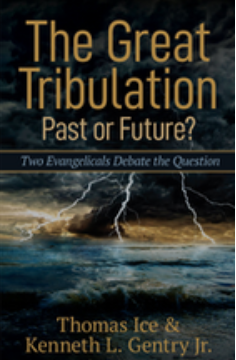
Debate book on the nature and timing of the great tribulation. Both sides thoroughly cover the evidence they deem necessary, then interact with each other.
See more study materials at: www.KennethGentry.com
THE PARABLE OF THE SOWER
In his first parable (Matt 13:3–23) we find material that fits well within a postmillennial scheme and differs greatly from dispensationalist and premillennialist expectations. This parable underscores Christ’s rejection of any political and militaristic conceptions of his kingdom. We see his resistance to such a view in another context when he perceives that a crowd was “intending to come and take Him by force, to make Him king,” for he “withdrew again to the mountain by Himself alone” (John 6:15).
In this parable Jesus notes that the kingdom which he proclaims spreads by means of God’s Word (cp. Matt 26:51–52; Luke 17:30–31) — not by “sword’s loud clashing.” And that its message fails to convert some hearers (Matt 13:18–23) — it will not dramatically win the victory all at once. He even explains that Satan hampers the kingdom’s growth (Matt 13:19). But despite all of this, the kingdom nevertheless gradually “bears fruit, and brings forth, some a hundredfold, some sixty, and some thirty” in those who convert (Matt 13:23). Furthermore, in the first century Christ sows his kingdom in the world in seed form — rather than presenting it as a full-blown kingdom coming dramatically at some distantly future date.
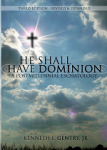
He Shall Have Dominion
(paperback by Kenneth Gentry)
A classic, thorough explanation and defense of postmillennialism (600+ pages). Complete with several chapters answering specific objections.
See more study materials at: www.KennethGentry.com
THE PARABLE OF THE MUSTARD SEED
In the parable of the mustard seed, Christ teaches that: “The kingdom of heaven is like a mustard seed, which a man took and sowed in his field, which indeed is the least of all the seeds; but when it is grown it is greater than the herbs and becomes a tree, so that the birds of the air come and nest in its branches” (Matt 13:31–32).
All would agree that this image symbolizes something magnificent beyond expectation: a minuscule mustard seed grows to become a large tree. Though birds could easily eat a mustard seed, the mature mustard plant becomes large enough that they flock to it in order to build nests in it for their young.
The Lord seems to build this parable by adapting imagery suggested by Ezekiel’s kingdom prophecy in Ezekiel 17:22–24:
“I will also take of the highest branch of the high cedar, and will set it; I will crop off from the top of his young twigs a tender one, and will plant it upon an high mountain. In the mountain of the height of Israel will I plant it: and it shall bring forth boughs, and bear fruit, and be a goodly cedar: and under it shall dwell all fowl of every wing; in the shadow of the branches thereof shall they dwell. And all the trees of the field shall know that I the Lord have brought down the high tree, have exalted the low tree.”
Here Ezekiel is symbolizing the universal magnificence and exaltation of the kingdom of heaven by contrasting it to Babylon’s kingdom (Eze 17:14). God’s kingdom will graciously provide shelter for all when it comes to full fruition in history. Both Ezekiel’s prophecy and Jesus’ parable point to the promised dominance of the heavenly kingdom in history: the small twig is planted on a high mountain above all the trees allowing birds to nest in its branches; the tiny mustard seed is planted and becomes the largest plant in the garden allowing birds to nest in its branches.
So then, the Mustard Seed Parable speaks of the kingdom’s massive, gradualistic extension in the world (cp. Matt 13:37–38). Clearly the kingdom will grow to a large size over time. It will not remain insignificantly small, nor will it erupt on the historical scene by catastrophic imposition. This fits the Old Testament expectation that he will “rule from sea to sea / And from the River to the ends of the earth” (Psa 72:8).
House Divided: The Break-up of Dispensational Theology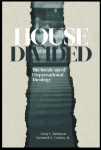 By Greg Bahnsen and Ken Gentry
By Greg Bahnsen and Ken Gentry
This book presents and defends Christian Reconstruction theology, particularly theonomic ethics and postmillennial eschatology. It does to by responding to dispensationalism’s social and exegetical theology.
For more educational materials: www. KennethGentry.com
THE PARABLE OF THE LEAVEN
The Lord’s next parable employs leaven as the key symbol. It reads: “The kingdom of heaven is like leaven, which a woman took and hid in three measures of meal till it was all leavened” (Matt 13:33).
Here Christ symbolizes the kingdom’s intensive progress in the world. Leaven is a penetrative agent that incrementally diffuses itself throughout its host from within (cf. Luke 17:20–21), for “a little leaven leavens the whole lump of dough” (1 Cor 5:6; Gal 5:9).
Thus, here the leaven will thoroughly penetrate the whole three pecks of meal (which represents “the world,” as in Matt 13:38). The kingdom will penetrate all (Matt 13:33). This was implied in other Kingdom Parables: the kingdom will produce a hundred-fold return in its converts (Matt 13:8). It will dominate the field (world) (Matt 13:30). It will grow to great stature (Matt 13:31–32).
THE KINGDOM PARABLES’ THEME
Both the Parable of the Mustard Seed and the Parable of the Leaven present Christ’s kingdom as gradually developing in history by the process of growth. Clearly Christ here explains the progressive nature and global extent of the kingdom that he is establishing during his ministry. After all, he opens his ministry by proclaiming “the kingdom of heaven is at hand” (Matt 4:17; cp. 3:2; 10:7). Then he immediately sets out preaching that kingdom (Matt 4:23) as a present reality (Matt 5:3, 10, 19; 6:33; 9:35; 12:28), which begins in earnest in the days of John the Baptist (Matt 11:11–12).
The kingdom of Christ does not come catastrophically as a full-blown, world-dominating kingdom; rather it comes gradually as it grows toward worldwide victory. This gradualism contradicts the premillennial view. Its dominance contradicts the amillennial position.
To quote a famous general, “I will return.” In my next article.
Click on the following images for more information on these studies:
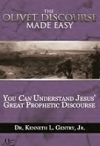

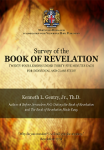
Kenneth L. Gentry Jr.'s Blog
- Kenneth L. Gentry Jr.'s profile
- 85 followers



